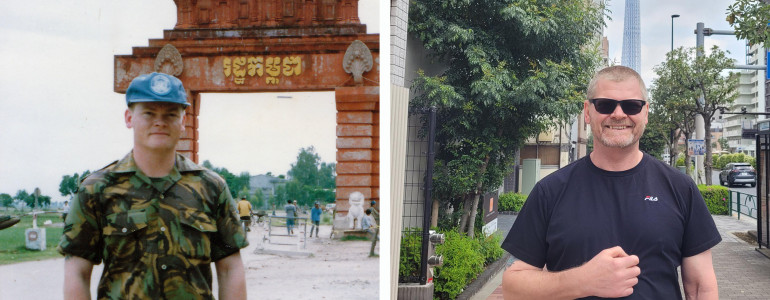I recovered from PTSD — Brian Kennerley

The following article was written by veteran of Cambodia, Brian Kennerley
My name is Brian Kennerley. I am a 56-year-old veteran currently being supported by Veterans’ Affairs for Post-traumatic stress disorder (PTSD) from operational service in Cambodia in 1993, and from 22 years in the Police Force.
I’ve had PTSD for decades, but I refused to acknowledge that I had a problem. I thought it was being weak, so I tried to manage my own mental decline until I couldn’t do it anymore.
I resigned from the Police in 2022, and although I found another job, my PTSD was not resolved, and I was medically retired in 2023.
I believed that I was weak because of having PTSD, and I didn’t want the stigma of it. My own perception of it meant that I had been living with PTSD for about two decades. I had arrived at a dark place. My family was suffering, and my marriage was suffering. I was deteriorating and considered suicide.
I never considered myself a veteran and hadn’t thought of contacting Veterans’ Affairs.
I thought a veteran was someone who had been fighting in the trenches, and that I wouldn’t fit the criteria. It was another perception that held me back.
I finally applied to Veterans’ Affairs with a claim of PTSD from my service in Cambodia. It was difficult applying. I had no idea what I had to do, and PTSD had fogged my brain up so much that I found it difficult to concentrate, let alone look at a website and figure out what to do.
I called Veterans’ Affairs and was contacted back relatively quickly by a case manager who explained clearly who they support and what they could assist me with. That case manager advised me at the time that if my conditions were related to my qualifying operational service (my deployment), they could support me.
Veterans’ Affairs approved my claim quickly, and their support began shortly afterwards. My case manager was very supportive and on to it. In addition to the treatment plan, she arranged for our lawns to be mown, the house to be cleaned and ensured that I was supported at home so that I could take care of my needs.
Veterans’ Affairs put together a very good wrap-around rehabilitation team for me. I had a case manager, psychologist, exercise physiologist, occupational therapist and a rehabilitation coordinator.
Key to my rehabilitation was my psychologist. She had a good process in place, which included Exposure Therapy and Talk Therapy (EMDR). Importantly, I felt safe during my sessions with her, which enabled me to open up and reach my goals. She was instrumental in my recovery, and I’m still receiving support from her.
The exercise physiologist helped me get out of the house. I never left the house unless I had to because I would generally get triggered by something, so I would save myself the stress and stay home. Just having her come inside my house was a big deal when we had our first session, but through the trust that she had built with me, she helped get me out of the house, just for a walk. Eventually, I joined a gym, and she attended the first sessions with me. I now go to the gym 2–3 times a week by myself, and Veterans’ Affairs pays the membership.
The occupational therapist also came to my house for sessions and introduced me to mental health and cognitive exercises. She helped me feel more comfortable around people coming into my home. Eventually, we met in a cafe for our sessions, which was great.
This wrap-around support provided me with a good support base from which I could begin to recover. My case manager, Genie, was very supportive and made sure that I felt looked after. She is in regular contact with me and keeps me updated, and I keep her updated as well.
As well as my physical and mental rehabilitation, Veterans’ Affairs paid for a consultant from Habit Health to provide vocational support, as I’m now cleared for part-time work.
The path has not been easy. It was extremely challenging, but I had a purpose, and I wanted to get better, which is the key. The professionals can help you on your path to recovery, but that won’t help unless you want to change and want to get better, and I did.
In just one year of rehabilitation, I went from severe PTSD to almost none. My depression is gone, and I never took any antidepressant. I’ve dropped 20kg since January 2024, and I’m keeping it off. My joints feel better, I feel better, and balance is being restored to my mind and body. I can go out by myself and drive around.
Importantly, my family is better. I was fortunate to have the support of my wife and family, and from friends who took it on themselves to help me on my journey. With their love and support and the professional help given to me by Veterans’ Affairs, I’ve made my recovery.
Thank you, Genie, Stacey, Natalie, Jennifer, Courtney and Caroline, for all your support.
If you are in a bad place and don’t know what to do, get in touch with Veterans’ Affairs. Give them a call. Talk with them, don’t wait like I did. Get help.
